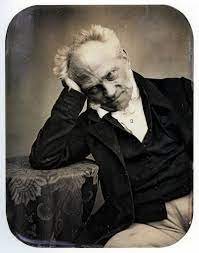EL PESIMISMO DE ARTHUR SHOPENHAUER
Este es otro de los filósofos más famosos de la última era, tanto que sus libros son muy buenos para todos quienes están suscritos al humanismo. Para otros que por razones académicas hemos tenido que pasar por algunos de sus escritos y que no podemos conciliar el sueño por las noches, rápidamente su redondeo hueco y vacío a las cuestiones de la vida torna pesadas las retinas de los lectores. Dentro de las obras más prominentes de este pensador están: el arte de siempre estar en lo correcto, el mundo como voluntad y representación entre otros pero el que más llama la atención es el de estudios sobre el pesimismo. La óptica de shopenhauer es muy similar a la de Sigman Freud quien fue contemporáneo y que además compartía el mismo pesimismo. Tanto que estuvo por varios años esperando su muerte, al punto de llegar a rentar una habitación en un hotel para esperar la muerte. Uno de los críticos más fuerte que tuvo que confrontar fue C.S. Lewis quien tras una visita al Zoológico y unas cuantas conversaciones con amigos como J.R.R Tolkien quien era católico y luego abandonó su ateísmo a los 33 años de edad. 
Regresando a Shopenhauer el trabajo que realizó fue en una línea consecutiva del pensamiento que dominó a Emanuel Kant sobre el mundo fenomenal y el mundo metafísico. La Biblia tiene mucho que decir con respecto a la certeza de la existencia de ese mundo. Tanto es así que lo que hagamos en esta carne tiene un impacto directo al Espíritu y también a las emociones. Cuando Caín mató a Abel en Genesis 4 es claro observar que aquellos requerimientos de carácter físico que Dios había pedido y la obediencia de su hermano en los mismos motivó a este hombre a matar a Abel por envidia y por que sus obras dice 1Juan 3:12 eran malas y las de su hermano justas. También en 2Cor.5:17 Pablo dice que es necesario compadecer al final de los tiempos ante el tribunal de Cristo para dar cuenta de nuestras obras sean buenas o sean malas. Así que por supuesto que todo lo que se haga en este mundo tendrá una afectación directa en el mundo espiritual. Sobre el pesimismo que gobernaba la vida de este Filósofo es obvio que no conocía a Cristo. De hecho no solamente el sino cualquiera que no ha nacido de nuevo observa la vida sin poder tener esperanza. En 2Co.5:17 Pablo dice que estar en Cristo significa haber experimentado una vida nueva. Su ejemplo es suficiente de hecho, pues en Filipenses 3:1-8 enlista los credenciales de su vida pasada los cuales consigna al final de la lista como “basura” cuando estos son comparados con la vida en Cristo. En 2Cor.1:9-10 leemos de la esperanza de ser librados de la muerte y esto es más profundo que la filosofía de Schopenhauer. En Gálatas 5:5 aquella ciudad gentil a quienes habían sido convertidos al Cristianismo les dice que los cristianos aguardamos por la fe la esperanza en la justicia. Si uno solamente observa el mundo fisico que nos rodea terminará amargado y con comentarios pesimistas como estos pensadores. Sientos de seguidores de Jesús fueron asesinados y perseguidos pero morían con fe, con esperanza y nunca maldiciendo a otros o cargados de odio. Quizás en contraste con la filosofía pesimista de Schopenhauer el texto en Hebreos 6:19 cobra mucho más sentido, pues temas como ancla del alma una segura esperanza que está firme. Tácito historiador muy respetado será el único autor pagano que relacione el incendio de Roma y el anticristianismo de Nerón. Suetonio, en la biografía del emperador, se dedica a informarnos que el emperador persiguió a los cristianos por profesar una superstitio nova et maléfica.
Es muy probable que la comunidad judía de Roma empleara sus posibles conexiones en la corte imperial para que se culpara a la comunidad cristiana y así poder evitar algún tipo de reacción popular antijudía a pesar que los judíos estaban en una posición más privilegiada que los cristianos, al ser considerada su religión como religio licita.
Dado que los castigos reservados a los cristianos son conocidos estaríamos ante la primera matanza de cristianos “en masa” empezando con Nerón quien posiblemente haya ejecutado a dos de los apóstoles de Jesús que más escribieron (Pablo y Pedro). En el caso del emperador Diocleciano, su persecución (año 95 d.C.) ha sido objeto de un fuerte debate historiográfico tal y como nos cuenta el investigador Jorge Cuesta Fernández ya que no encontramos una coincidencia entre autores paganos y cristianos en atribuir anticristianismo a este emperador tal y como sucede con Nerón, sin embargo no elimina la ostilidad que se mostró ante el Cristianismo. La razón por la que traigo esto a colación es sencilla. Existe abundante evidencia documentada y tangible de las persecuciones de los cristianos y su voluntad para morir siendo inocentes de las maneras más brutales constituyen fuerte evidencia que su esperanza no se encontraba nada más en las comodidades de esta vida. Su esperanza en la vida futuro los llenaba de gozo, los escritos que fueron inspirados por Dios los alimentaban de esa esperanza como lo es el libro de Apocalipsis por poner un ejemplo. El pesimismo de Arthur y de cada ateo que existe en este mundo brota a raíz de la ausencia de Dios en sus vidas. Juan Fox en su libro “ El libro de los Mártires” menciona lo siguiente en la página 11 de la versión en español, él dice:
Muchos fueron crucificados en el Monte Ararat, coronados de espinas, siendo traspasados con lanzas, en imitación de la pasión de Cristo. Eustaquio, un valiente comandante romano, con muchos Èxitos militares, recibió la orden de parte del emperador de unirse a un sacrificio idolatrico para celebrar algunas de sus propias victorias. Pero su fe (pues era cristiano de corazón) era tanto mas grande que su vanidad, que rehusónoblemente. Enfurecido por esta negativa, el desagradecido emperador olvidó los servicios de este diestro comandante, y ordenó su martirio y el de toda su familia.
En el martirio de Faustines y Jovitas, que eran hermanos y ciudadanos de Brescia, tantos fueron sus padecimientos y tan grande su paciencia, que el Calocerio, un pagano, contemplándolos quedó absorto de admiración, y exclamación, en un arrebato: ¡Grande es el Dios de los cristianos! , por lo cual fue prendido y se le hizo sufrir pareja suerte.
Muchas otras crueldades y rigores tuvieron que sufrir los cristianos, hasta que Quadratus, obispo de Atenas, hizo una erudita apología en su favor delante del emperador, que estaba entonces presente, y Arístides, un filosofo de la misma ciudad, escribe una elegante epístola, lo que llevó a Adriano a disminuir su severidad y a ceder en favor de ellos.
El emperador Adriano murió en el 138 d.C y el Cristianismo continúa de pie hasta la actualidad con presencia en casi todos los países del mundo entero. Como algunos de estos cristianos que han sido documentados hay cientos y miles que Dios si conoce y ha enlistado sus nombres en el libro de la vida. Ellos fueron gozosos en esta vida y serán llenados de gozo elevado al cuadrado cuando aparezca el Señor Jesús en el cielo (Hechos 1:9).
Si usted es un estudiante universitario que está siendo expuesto a corrientes Filosóficas o la obra de estos señores en materia de la razón, le anímo a que mantenga en mente que ellos fueron buenos en sus aréas pero ignorantes (la gran mayoría) de las bondades del Señor y el verdadero gozo que proviene de seguir a Jesús.



